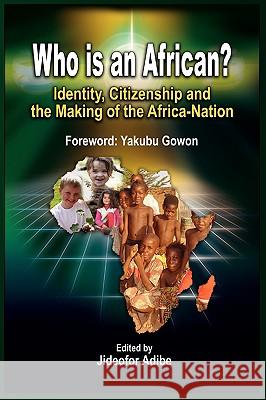Who Is an African?: Identity, Citizenship and the Making of the Africa-Nation » książka
Who Is an African?: Identity, Citizenship and the Making of the Africa-Nation
ISBN-13: 9781906704551 / Angielski / Miękka / 2009 / 242 str.
Who is an African? At face value, the answer seems obvious. Surely, everyone knows who the African is, it would seem. But the answer becomes less obvious once other probing qualifiers are added to the question. How is the African identity constructed in the face of the mosaic of identities that people of African ancestry living within and beyond the continent bear? Do all categorised as Africans or as having an African pedigree perceive themselves as Africans? Are all who perceive themselves as Africans accepted as such? Are there levels of "Africanness," and are some more African than others? How does African identity interface with other levels of identity and citizenship in Africa? And what are the implications of the contentious nature of African identity and citizenship for the projects of pan-Africanism, the making of the Africa-nation, and Africa's development trajectories? Contributors to the volume, including Ali Mazrui, Kwesi Prah, Gamal Nkrumah, Helmi Sharawy and Marcel Kitissou, address these questions and more. They examine the issues of African identity and citizenship, the politics spurned by the co-existence of peoples of different Africanities in the same country, and the prospects of constructing an Africa-Nation in which Africans of all hues are as sentimentally attached to, as say, the Europeans are attached to Europe. Though the projects of pan-Africanism and the making of the Africa-nation have not achieved the desired levels of success, some of the contributors found sufficient grounds for optimism: These grounds include the deepening democratic ethos in the continent, which is believed will unleash a love of freedom that will supersede the fissiparous tendencies that underlie the various notions of Africanity; and the rise of new economic powers such as India and China, which are increasingly looking towards Africa as the next big destination. The emergence of Barrack Obama, whose father is Kenyan, as the President of the United States of America, also appears to be unleashing a new wave of can-do attitude. It is argued that for many Africans, Obama is both an African name they can relate to, and a metaphor expressing that anything is possible if you strive hard for it with the 'right attitude.' This 'right attitude' is an attitude that is post-chauvinism, for it is only by being post-racial and a reconciler that a Blackman, with an African Muslim father, who was not born into privilege, could emerge president of the most powerful country in the world. This lesson is not lost on Africans and it is a powerful boost to the African unity project. _________________________________________________ Jideofor Adibe studied political science at the University of Nigeria, Nsukka, and was the first to complete a doctorate degree in International Development Studies at Roskilde University, Denmark. He also studied the New Economic Powers at Oxford University, United Kingdom, and equally holds an LLM degree in Media Law from City University, London. He has been a guest research fellow in a number of institutes, including the Centre for Development Research, Copenhagen, Denmark, the Centre for Developing Area Studies, McGill University, Montreal, Canada, and the Scandinavian Institute of African Studies, Uppsala, Sweden. He is currently the editor of the multidisciplinary journal, African Renaissance, and the publisher, Adonis & Abbey Publishers Ltd. His books include The Loneliness of Exile (in Danish translation, 1995), Broken Dreams (2003) and Free Speech v Reputation: Public Interest Defence in American and English Law of Defamation (2009). He also writes a weekly column for a major newspaper in Nigeria.











